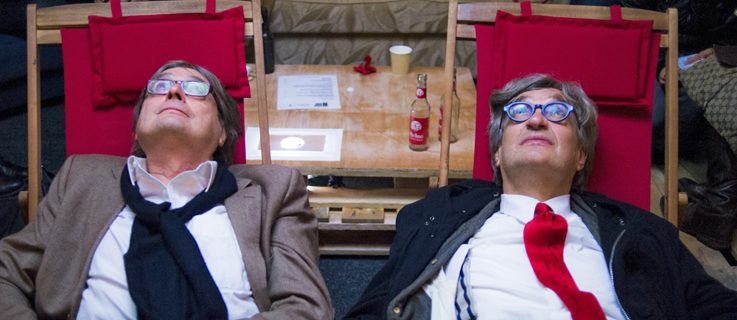Germany prides itself in having film festivals dedicated to almost every genre and region in the world. The scene is unique worldwide – and so diverse that one tends to almost lose track of them all. Film critic, Michael Kohler, presents his ten favorite festivals.
German film festivals should actually not really be doing very well at all. Home cinemas are getting bigger, moving images are accessible all the time via smartphone and film history is often just a mouse click away. Nevertheless the opposite is the case – film festivals in Germany are booming, every decent-sized city has one, and you could in fact spend practically all of the year hopping from one of the German film festivals to the next.
So how can this be explained? First of all, film festivals are all the rage at the moment; more and more (short) films are being produced and distributed via more and more channels, without anybody peaking out on them – against this scenario festivals provide orientation. And they offer the audience not only big screens and premieres, but also a feeling of community that cannot be compared with watching a film at a normal cinema. As soon as a film in the cinema is over, the audience usually disperses in all directions, whereas festivals keep the festival goers interested with a variety of attractions. They resemble global villages with guests from all over the world. You might even see a few stars or meet filmmakers, or both, and in Germany there is something to suit almost every taste. There is hardly a niche, region or genre that does not devote itself to at least one festival. Not only is the density of the German film festival scene unique, but also its variety. This is made possible not least by its active promotion by the German federal government, the regional governments of the Länder and the municipalities, which see film festivals as attractive location and tourism factors. Digitisation also plays an important role, because films are much more readily available due to digitisation and the costs, especially for transport and maintenance, are correspondingly lower.
Faced with such a variety of festivals, it is more or less impossible to pick out the most important ten. Some of them are, of course, in a league of their own, such as the Berlinale, the Kurzfilmtage Oberhausen or the Leipzig Festival for Documentary and Animated Films. This trio represents in equal part the long tradition of film festivals in Germany, as well as their internationality. It represents federalism, which promotes culture in the entire country, instead of only in a few centres, and, last but not least, these three festivals, and the history they can look back on, represent the overcoming of the division of Germany.
The other members of the “Top Ten” each have something that sets them apart from the rest: The Filmtage Hof festival is like a family get-together for the German film community, Down Under Berlin is a typical capital start-up, the Fantasy Filmfest a successful fan project and the Filmfest Munich is attractive with its urban flair. One thing, however, that all German festivals have in common – they are open to the general public. Snobbism à la Cannes is alien to them.
The Berlinale: “shop window on the free world”
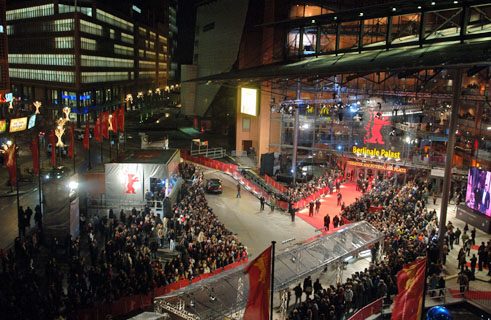 The Berlinale Palast: premiere venue for the Competition films and prestigious location for all gala ceremonies
| Foto (Ausschnitt): © Berlinale 2006, Andreas Teich
The Berlinale Palast: premiere venue for the Competition films and prestigious location for all gala ceremonies
| Foto (Ausschnitt): © Berlinale 2006, Andreas Teich
This most important of all German film festivals dates back to an idea that came from American film officer, Oscar Martay. In 1951, he wanted to set up a “shop window on the free world” in the ruins of the divided city of Berlin and convince the Germans of the superiority of the West with film stars and Hollywood cinema. As a child of the Cold War, for many years the Berlinale remained a political festival in the “frontline city” of West Berlin. In 1970, for example, the jury resigned due to the controversy over Michael Verhoeven’s Vietnam war movie
O.K.. In 1979 the socialist countries boycotted the festival in protest against Michael Cimino’s
The Deer Hunter. Today, the Berlinale takes place in the heart of a reunited Berlin and, with its close proximity to audiences and the promotion of newcomers, it stands out in comparison to the other big film festivals in Cannes and Venice. In 2016 over 335,000 tickets were sold. This makes the Berlinale Europe’s largest film festival and the biggest public festival in the world. Since 2003, young filmmakers have been able to get together at the Berlinale Talent Campus with established players from the film industry, the aim being to plan the next steps in their careers.
Internationale Filmfestspiele Berlin (Berlinale): Founded: 1951. Location: Berlin. When? February. Program: international premieres, art house cinema, film history. Main Prizes: Golden Bear, Silver Bear.
Kurzfilmtage Oberhausen (The Oberhausen Short Film Festival): Film as subversive art
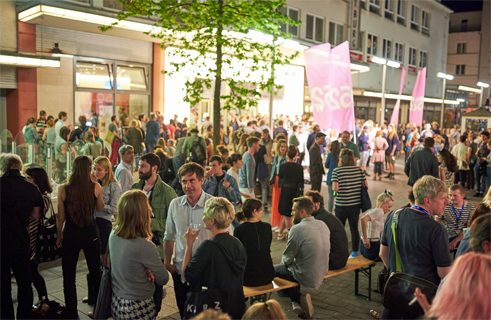 62nd International Short Film Festival Oberhausen, festival atmosphere
| Foto (Ausschnitt): © Kurzfilmtage / Daniel Gasenzer
62nd International Short Film Festival Oberhausen, festival atmosphere
| Foto (Ausschnitt): © Kurzfilmtage / Daniel Gasenzer
Short films are not only shorter, they are also more flexible and faster in the way they are made. Short films give you an opportunity to try things out that you would not risk in a longer feature film. For that reason alone the short film is subversive. This has always been the case in Oberhausen and that is why, in the middle of the Cold War, films from the East Bloc were shown there which were not shown anywhere else in the West. That is why, in 1962, a group of young German filmmakers in this city in the Ruhr region voiced their anger over the cinema of the economic miracle years in the so-called Oberhausener Manifest (a declaration to establish a “new German feature film”). In 1968 director Hellmut Costard caused a scandal by making a film, in which he criticised German film funding policies – with the aid of a talking penis. As the oldest short film festival in the world (founded in 1954), Oberhausen has experienced quite a lot, but has always managed to remain young. For instance, by being one of the first to take the music video as an art form seriously, or by thinking about what might happen to the short film when it is shown as a video in a museum. Oberhausen, however, will probably never turn into a film museum. The festival is too flexible and too fast-moving for that to happen.
Internationale Kurzfilmtage Oberhausen: Founded: 1954. Location: Oberhausen. When? End of April / beginning of May. Program: short films of all kinds. Main prize: Grand Prize of the City of Oberhausen, MuVi Prize for German music videos
DOK Leipzig: An inspirational niche
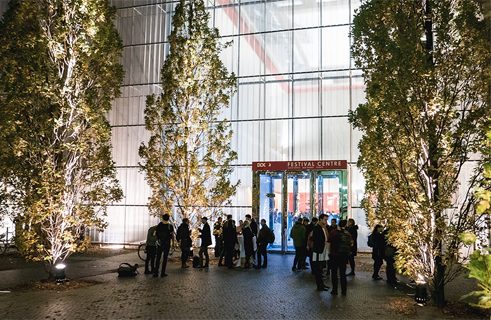 Festival Centre, Dok Leipzig 2016
| Foto (Ausschnitt): © Dok Leipzig 2016 / Susann Jehnichen
Festival Centre, Dok Leipzig 2016
| Foto (Ausschnitt): © Dok Leipzig 2016 / Susann Jehnichen
Since 1962, the prizes awarded at the Leipzig documentary festival have been in the form of gold and silver doves. They go back to a draft that Pablo Picasso submitted for the World Peace Congress of 1947. The goings-on behind the scenes of the oldest documentary film festival in the world, however, were seldom very peaceful. The more important the festival became, the stronger the inclination of the GDR leadership became to influence the program politically. Nevertheless Leipzig was an important platform for the cultural exchange between East and West and an important showcasing event for films from Asia, Africa and Latin America. After the fall of the Berlin Wall, the festival had to reinvent itself. The animated film became an independent part of the festival, turning it into an international “centre of excellence”, in which co-productions were initiated and film programs for other festivals and cultural institutions were designed. The most important thing about Leipzig, however, is maybe that every year they manage to prove that audiences can be inspired by the “niche program” of the documentary film.
Dok Leipzig: Founded: 1955. Location: Leipzig. When? End of October / beginning of November. Program: documentaries, animated films. Main Prizes: Golden Dove, Silver Dove.
Hofer Filmtage: A stage for the stars of tomorrow
 Football at the Hofer Filmtage
| Foto (Ausschnitt): © Evelyn Kutschera
Football at the Hofer Filmtage
| Foto (Ausschnitt): © Evelyn Kutschera
There is a red carpet in Hof, but what is much more important is the green lawn. Since the founding of the Filmtage festival in 1967, a football team formed by the festival staff has played against a team of actors, producers and directors. As you can gather, things are much more laid back in Hof. The festival is something like a family get-together of the German film world, although it is quite likely that a fair number of international guests will be invited for the independent film section and for the retrospective dedicated to a director. Hof, however, has established a legendary reputation as a stage for newcomers to the German film scene – as a festival for young directors and other discoveries, even more so than the Berlinale. “We do not need stars, we make them”, said Heinz Badewitz, the founder and chairman of the Hof festival who died in 2016. And for that reason, every year people travel to this town in the Bavarian provinces to see if he was right.
Internationale Hofer Filmtage/Hof International Film Festival: Founded: 1967. Location: Hof. When? October. Program: German films, independent cinema. Main Prize: The “New German Cinema” Sponsorship Award.
Filmfest München: Summer in the city
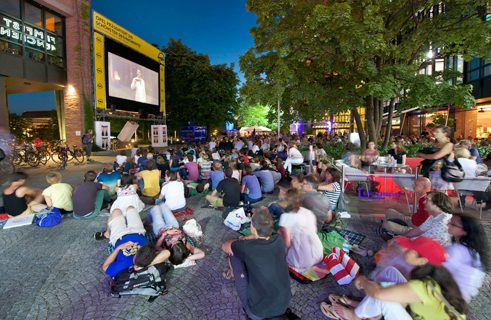 Open Air at the Filmfest München
| Foto (Ausschnitt): © Filmfest München
Open Air at the Filmfest München
| Foto (Ausschnitt): © Filmfest München
It is no coincidence that the Filmfest in Munich takes place in the early summer, when the city is at its most beautiful. The date at the end of June is very much part of the program, “where the magic of cinema meets summer in the city”, as the advertising for the festival goes. No wonder then that it regularly attracts the likes of star-directors Sergio Leone, Lars von Trier, Werner Herzog and Roman Polanski. In addition to retrospectives about important filmmakers and – more rarely – well-known actors, the festival offers an up-to-the-minute cross section of international art house cinema, many German premieres and numerous German TV productions; the latter compete for the Bernd Burgemeister TV Prize. Selling around 80,000 tickets, the Filmfest München is the most successful German public festival after the Berlinale and also a favourite meeting place for the German film industry. Not least because you can enjoy the festivities in Munich in the open air.
Filmfest München/Filmfest in Munich: Founded: 1983. Location: Munich. When? End of June / beginning of July. Program: international cinema, German film. Main Awards: Arri / Osram Award, the “New German Cinema” Sponsorship Award.
Filmfestival Cottbus: Gateway to the East
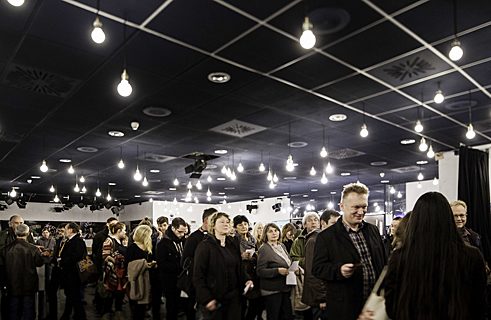 Filmfestival Cottbus, Kammerbühne
| Foto (Ausschnitt): © Florian Bröcker
Filmfestival Cottbus, Kammerbühne
| Foto (Ausschnitt): © Florian Bröcker
Sometimes fear can be a good thing – “we were afraid,” says Bernd Buder, “that the Eastern European film would disappear altogether from screens” – and that is why, in 1991, Buder and some of his friends founded a festival for the cinema of the former socialist “sister countries” in their hometown of Cottbus. The location fitted in perfectly with the program: Cottbus is close to the German-Polish border and is now a gateway to the East; many of the films shown also reflect the conflicts in the former Soviet republics. After modest beginnings, the festival recently featured more than 150 films from 40 countries. In 2007, it was ranked among the 50 most important film festivals in the world by
Variety. The festival is also firmly anchored in Cottbus itself, a medium-sized town with 100,000 inhabitants. In terms of figures, one in every five Cottbus residents attends the film screenings that take place all over the city.
Filmfestival Cottbus: Founded: 1991. Location: Cottbus. When? November. Program: Eastern European film. Main Awards: Best Film, Best Director.
Lucas: Films for children
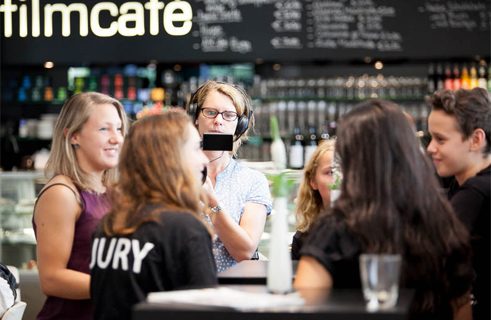 Lucas - Internationales Festival für junge Filmfans
| Foto (Ausschnitt): © Sabine Imhof, Quelle: DIF (Deutsches Filminstitut)
Lucas - Internationales Festival für junge Filmfans
| Foto (Ausschnitt): © Sabine Imhof, Quelle: DIF (Deutsches Filminstitut)
Since 2016, there have been quite a lot of new things going on at the oldest German children’s and youth film festival. There are now four competitions for films aimed at three age groups: from four, eight and 13 upwards, with each one awarding prizes for the best short and long film. The basic idea of the festival remains unchanged, i.e. to involve children and young people in as many fields of the festival as possible. In Frankfurt, for example, they not only take up half the seats on the juries, they are also involved in the selection of the films and help prepare the film discussions. In other words, the festival is meant to be fun for children. Nevertheless, it also serves a “secret” educational purpose. “These days we are confronted with moving images on every street corner, on the subway platform and on our own smartphones”, says Claudia Dillmann, director of the Deutsches Filminstitut (German Film Institute), which is the driving force behind Lucas. “At as early a stage as possible, we want to give children tools that will help them to understand and deal with film as a medium and an art form.”
Fantasy Filmfest: Fun with Zombies
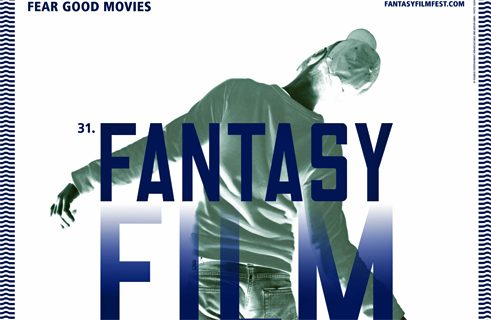 Fantasy Filmfest, poster
| Foto (Ausschnitt): © Fantasy Filmfest
Fantasy Filmfest, poster
| Foto (Ausschnitt): © Fantasy Filmfest
In its early days the Fantasy Film Festival was often the only place to see uncensored versions of horror films and on the big cinema screen (or even to see them at all). These days, audiences enjoy these things conveniently delivered to their homes, yet nevertheless, what started off as a hobby for some horror film fans, is now in its 30th year of existence. From mainstream thrillers to animes to the art house horror film, the Fantasy Filmfest has every variation of the fantasy film in its repertoire and takes them on tour every year through seven German big cities, similar to a traveling circus. Despite the numerous German premieres, the focus is no longer on the enthusiasm for discovering something new, but more on the festival’s event character. The fan base meets in a festive setting, celebrates not only the fun of spilling artificial blood, but also itself at the same time. And something else has changed – it is no longer just a men’s thing, more and more women are discovering the qualities of the horror film.
Fantasy Film Fest: Founded: 1987. Location: diverse. When? August - September. Program: fantasy, horror, thriller. Main Prize: Fresh Blood Award for the Best Debut Film.
Internationales Frauenfilmfestival: two festivals in one
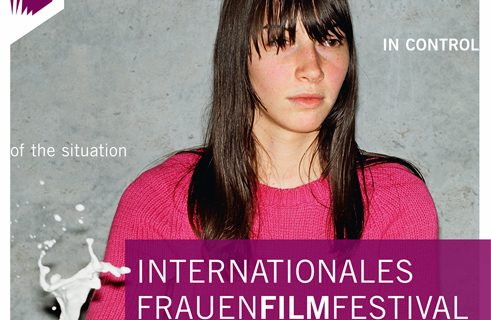 Internationales Frauenfilmfestival Dortmund
| Foto (Ausschnitt): © Silke Weinsheimer
Internationales Frauenfilmfestival Dortmund
| Foto (Ausschnitt): © Silke Weinsheimer
This festival is actually two festivals in one. In 2006, the Feminale (Cologne) and the femme totale (Dortmund), founded in the 1980s, were merged into one festival at the behest of the North Rhine-Westphalian regional government. Since then, the venue has alternated annually. In both cities films are shown that have been made exclusively by and with women, but the accents are set differently. Whereas in Dortmund there is always a thematic focus (2017 it was “control”) in addition to the international competition, Cologne showcases the female film production of a particular country (in 2016 it was Mexico) and devotes itself to current lesbian movies. In addition to female film directors, the festival also tries to honour the work of women who work on the “technical” side of filmmaking, such as camerawomen, writers and producers. Since 2012, a national competition for female cinematographers has been held in Cologne.
Internationales Frauenfilmfestival: Founded: 2006. Locations: Dortmund / Cologne. When? April. Program: women’s Films, lesbian movies. Main prizes: Best Director Prize, Prize for Best Feature Film Debut.
Down Under Berlin: A bridge to Australia
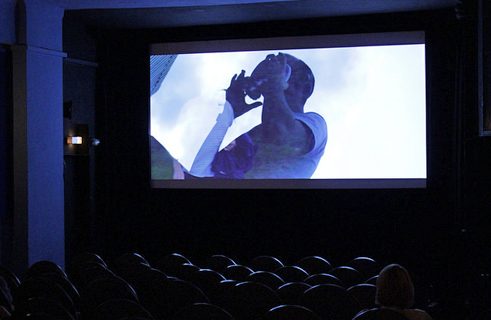 Down Under Berlin
| Foto (Ausschnitt): © JordiSanjuanRubio_1587, Courtesy of Down Under Berlin
Down Under Berlin
| Foto (Ausschnitt): © JordiSanjuanRubio_1587, Courtesy of Down Under Berlin
This insider tip among the German film festivals is so secret that it still has no Wikipedia entry, even five years after its launch. Down Under was founded by Berliner-by-choice, Frances Hill, who wanted to provide a platform for the cinema of her Australian homeland in the Moviemento Cinema in Berlin. Since then, Ms Hill has been presenting special Australian (and New Zealand) films every year and, of course, films made by Australians who, like herself, live abroad. Down Under Berlin is thus both a festival for the homesick as well as a voyage of discovery to a distant continent. Those people who believe that they know the cinema “down under”, because they have seen the films of the many Australian directors who have been recruited by Hollywood, are in for an eye-opener. In the meantime, Down Under Berlin has become the largest European festival of its kind. It shows blockbusters as well as art house films, shorts and documentary films and the work of indigenous filmmakers.
Down Under Berlin: Founded: 2011. Location: Berlin. When? September. Program: Australian cinema, New Zealand cinema. Main prize: Audience Award.
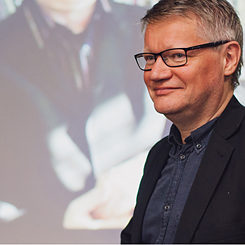 © Katerina Bakurova / Bayerisches Haus Odessa
The Joy of sharing Films: Film Curators
© Katerina Bakurova / Bayerisches Haus Odessa
The Joy of sharing Films: Film Curators
Film curators pick the films that are to be shown during festivals and special film series in cinemas, cinematheques and other cultural institutions – a dream job with no formal training.
